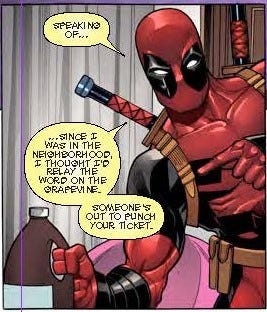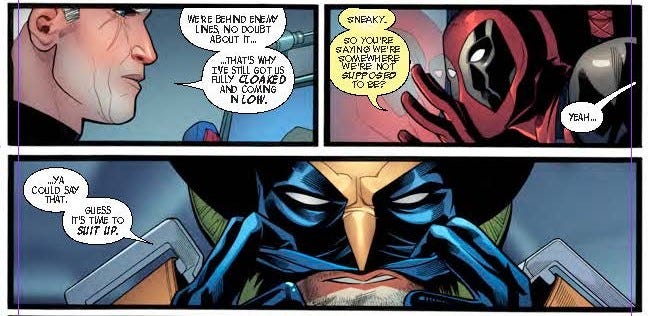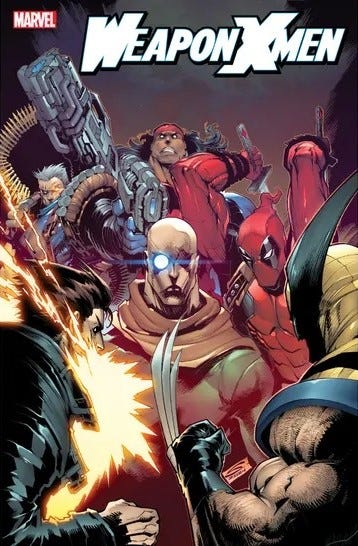Another disclaimer to start this one off: There’s a very good chance that I don’t know what the hell I’m talking about. Consider this as just me shooting from the hip, a rambling rant in which factual coherence is not my top priority, a completely subjective point of view presented for your newsletter-reading pleasure.
So, okay… let’s talk about how to sell a new comicbook series -- even one that, in theory, should be a relatively easy sell -- to what has become a generally uninformed and increasingly disconnected readership. Let’s start at the beginning…
There was a time when the Direct Market didn’t exist. Comicbook stores -- as we know them today -- didn’t exist. Publishers worked with distributors (typically magazine/periodical distributors), who, in turn, sold the product to newsstands. Under this system, comicbooks were returnable just like any other periodical. That meant that any risk on the retail front lines -- financial or otherwise -- was considerably minimized. Some vendors would actually curate their spinner rack offerings, since they seemed to have at least a passing awareness of their clientele (in most cases, a steady stream of entertainment-starved kids with some pocket change).
And these kids generally had no real idea what they were shopping for. What was displayed on the spinner rack was what they had to choose from. And, aside from the house ads found within the comicbooks themselves, there was no marketing to assist them with their shopping. These kids had no awareness of advance solicitations, of non-lettered previews, of which creative teams were coming on to which comicbooks. These kids simply showed up… perused the product they found there... flipped through them… made their choices… cultivated their favorites… and some of them eventually got hooked on the medium.
And I should know. Because that was me. That was how I fell in love with comicbooks, starting when I was five years old. It was as pure of a relationship as you could imagine.
Needless to say, things are much different now. And, in hindsight, the changes happened relatively quickly. In the early 1980's, the establishment and innovation of the Direct Market made dedicated retailers the prime source for all of our specialized comicbook needs. It allowed for new publishers to not only survive, but thrive. It energized and focused a fan culture unlike anything the medium had ever seen before. It created a much more informed readership, one that was becoming hyper-aware of the culture of the industry, like which creators were "hot"... and which were not. Fanzines of all types were being published, partially to hype upcoming titles and storylines in order to build anticipation and stir up some genuine buzz. It created a type of industry literacy that could transform fans into self-styled "experts" who prided themselves on their so-called “insider knowledge" of the comicbook business.
(Of course, it also promoted higher sales and established an evolved collector's market that grew more and more profitable as these Direct Market stores settled into their second decade -- the 1990's -- but that’s an altogether different topic than what we’re discussing here today)
But here's the thing... what originally saved this industry might now be killing it.
Because here's where we've ultimately arrived: the Direct Market is now a fairly closed system catering to an increasingly limited readership, where effective marketing tactics and significant pre-release awareness is now almost solely what determines the success and/or survival of a new series, where retailers have no choice but to assess potential sales based on whatever scant info is provided to them beforehand. That info comes mainly from the publishers themselves, who often have either limited marketing resources or, even more frightening, limited awareness of their own product.
Y’see, the steady decline of print media means all the fanzines are gone. No more Amazing Heroes, Comics Interview or Wizard Magazine. And no one really reads the Internet anymore (this newsletter notwithstanding, of course!). No one goes to sites like Newsarama or CBR in any significant numbers. And the comicbook YouTube community -- as great as it can be, at times -- is still years away from being any kind of centralized source of industry-wide information. And so, the marketing of new material is as limited as it's ever been since before the Direct Market existed. Only now we can’t fall back on the casual, younger customers that don't need that kind of marketing, yet will still dependably pick up comicbooks on the newsstands and spinner racks, ensuring that new generations of readers will faithfully show up to refresh the audience, especially for mainstream material. Because, quite simply, American kids don't read comicbooks anymore. They're not going to be making the same kind of magical discoveries that I made when I was a kid, that firmly set me on a path which basically determined my entire life.
And so… with the current, aging readership not nearly as informed as they were even ten years ago, the opportunities to create genuine buzz -- let alone suitable awareness -- for projects that might greatly benefit from it are really hard to come by. Individual retailers are busy enough just placing their weekly orders from (at the moment) multiple distributors, so there’s little chance they’d be able to keep up with the perpetual white noise of perfunctory press releases that publishers fire off several times a week, let alone read (or watch) a creator interview. So what do they do? They have to fall back on simple name recognition and level of publisher commitment in what I believe has become a very specific formula: “specifically line-branded, iconic superhero name” + “number of variant covers” (and it probably goes without saying, a “#1” on the cover certainly helps). Hence, Ultimate Batman (or Absolute Spider-Man, if you prefer) offered with tons of variant covers (along with what are hopefully very retailer-friendly order incentives) automatically gets bigger orders. Those line items on a distributor order form are literally a no-brainer. If I was a retailer, that’s probably how I’d do things, too. As a businessman, you have to go where the money is.
So sales may be up, but I would guess those levels have been reached because of these ordering formulas, not because there are any more comicbook readers. But I guess I just think that, with the way things are right now, we’re still leaving plenty of money on the table.
Here's an example of how things are different… in a few short months, Jeph Loeb and Jim Lee return to the BATMAN monthly for the sequel to their best-selling Bat-collaboration from twenty plus years ago, called “Hush”. They announced it at NYCC last year (in matching t-shirts, no less). There was a short prelude story that ran in the first issue of the recently relaunched JUSTICE LEAGUE UNLIMITED. And I suppose there’s been the random mention of it here and there in the weeks since.
Now… if you compare this to twenty years ago, between Wizard Magazine and the centralized comicbook news websites, you couldn’t get away from the hype that led up to the release of the first “Hush” series. It was literally everywhere. I’d imagine that every retailer in the Direct Market not only knew it was coming, but thanks to DC’s extensive marketing efforts (in outlets the retailers were already plugged into), they probably had a pretty decent sense of what it was going to be. Based on that, they ordered appropriately and “Hush” was a blockbuster. Will “Hush 2” match those sales? We’ll find out soon enough. As I write this, we’re still two months away from its release, so there’s still some time for DC to make a full-court press.
But that kinda brings us back to the notion of bandwidth. Older readers just don’t have the same attention span -- for certain things -- that we did when we were teenagers… or even in our twenties or thirties. And if older readers are the majority of mainstream comicbook readers (and most market research tends to confirm this), then marketing to that demo -- just creating general awareness for chrissakes -- is an uphill climb, to say the least.
As a creator, it can get a little frustrating. To promote upcoming work, it becomes necessary to do a dozen (or more) interviews with multiple outlets across multiple platforms. Now, don’t get me wrong… I love talking comicbooks, but there’s only so many hours in the day.
There are often things you can't control. For instance, the series I wrote for DC Comics last year, KNEEL BEFORE ZOD, was the unfortunate victim of hazy marketing and confused messaging. Based on the info provided to them by DC, the few “press outlets” I talked to when promoting the series’ launch had no idea whether or not the series took place in current continuity (it did). They weren’t sure if it was meant to tie into the Superman line of books (it was). It was a very sad case where the initial marketing push -- in that crucial, narrow window where you make that vital first impression -- dropped the ball and the book certainly suffered for it.
More recently, Marvel has branded the WEAPON X-MEN launch as part of their upcoming ONE WORLD UNDER DOOM event, despite our series having absolutely no connection to it -- outside of a single sequence that takes place in the forests of Latveria and a passing mention of the current state of the Marvel Universe. I’m not sure that counts. And until the actual solicitation went live, I had no idea that particular branding was going to be there, so I had no opportunity to affect it, one way or another. But I know some folks have seen the branding and been confused in an “is it or isn’t it?”-kind of way. To me, that’s a problem.
Now the question becomes... will WEAPON X-MEN actually benefit from the associated branding? Or, if the wider event underperforms in the marketplace, does that hurt the series' greater potential? Hell, your guess is as good as mine. Fingers crossed, though…
Let me be clear, I’m not pointing fingers. I’m not slinging mud or laying blame. There are many people that you never hear about, behind the scenes, working hard at their jobs, trying to make the best out of a weird market situation. That’s not me being cynical, I’m just making an observation…
It’s the system that’s a bit broken. And I don’t see it getting fixed anytime soon. In the meantime, we’ll press on, making the best comicbooks we can and hoping there’s a big enough audience out there to allow us to keep doing it.
In that spirit, here’s something you can make sure your LCS is 1) aware of, and 2) is placing a healthy order for. This is a March 2025 release…
WEAPON X-MEN #2
BARON STRUCKER STRIKES! An enemy from Wolverine’s distant past has claimed his first victims – and one of them is Wolverine himself! And the rest of Weapon X-Men may not make it in time to save them from Strucker’s insidious plans of world conquest! Introducing, for the first time anywhere – Wolverines of Mass Destruction!
32 PGS./Rated T+ …$3.99
Joe Casey
USA










As an indie comic reader and creator, these kinds of discussions seem kind of weird to me. Kids read comics by the truckload over on webtoons, tapas, and deviantart. They create them by the truckloads. There's the annual comic contest sponsored by Clip Studio Paint over on Pixiv. I've been following a really good fancomic that just wrapped up that was a crossover of Sonic the Hedgehog and Ninja Turtles. My kids work their way through my old Sonic Archie comic collection every few weeks, and then turn around and chew through Daddy's Kamen America collection, as well as the collectors edition Earthworm Jim books. Kids still want comics. But modern comics aren't made for kids. (Seriously, I was listening to a review of that new Ultimate series or whatever it is, and it's all an ode to communism and evil. Nothing about it is aimed at kids, it's designed exclusively as twitterbait.) Comics aren't made for kids, marketed to kids, anything. They don't want to capture the young audience. But the very few times they throw the young audience a bone, it goes nuts. Do you know how hard it was to find the Batman/Fortnite crossover comic? It sold like *hotcakes*.
Kids are discovering comics on all kinds of social media places. There are the actual art sites like Deviantart, Webtoons, Tapas, and probably others, but I find comics in Instagram, YouTube and TikTok reels. They’re also on Tumblr and Substack. Kids are still finding comics, just not like you did.
I think it’s important to remember that kids are going to seek out free stuff especially if they can’t buy in person. They don’t want to borrow Mom’s credit card to read a comic so they’re going to read the free ones online. I grew up on those comics. They were fun and I got new installments regularly.
Another thing that made traditional comics inaccessible to readers is that they aren’t formatted for phones. I have tried borrowing traditional comics on Hoopla but I hate reading them because my phone screen is too small.
The indie comic creators use Patreon a lot. They put the comics up for free and a reader can pay for extra content and/or to read pages early. I see a lot of people doing this in the indie communities.